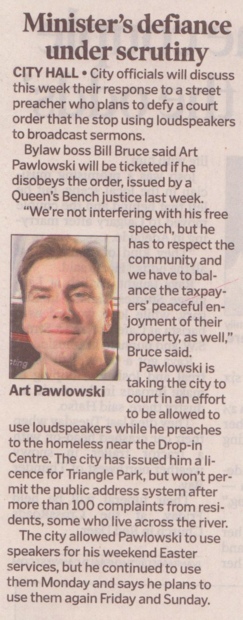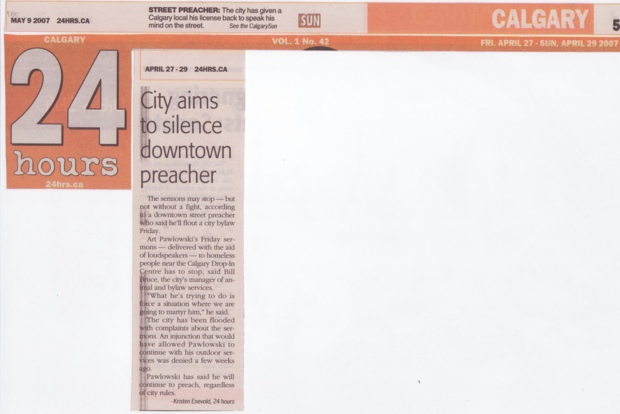Court ruling loudly favours street preacher
By Paula Arab, Calgary Herald
Every city has its sounds. Church bells remind me of crisp mornings in Quebec City. I’ve just experienced the Muslim "call to prayer," in Beirut, and its haunting Arabic singing that echoes through the streets.
There are universal big-city sounds, like cars honking, the subway rumbling or the sirens screaming: "Move over," filling the air with foreboding.
Then there’s noise pollution. Souped-up motorcycles and cars with giant mufflers fall into that category. So does stereo music, blaring at all hours, or the noise of construction machinery firing up before sunrise. But a minister preaching the word of God on a Sunday afternoon, to the homeless? I don’t think so.
We expect police and bylaw officers to be able to draw the fine line between acceptable sound and unreasonable noise, particularly when neighbours are fighting and emotion is involved.
The city’s protracted legal case against street preacher Artur Pawlowski would indicate authorities don’t know the difference.
Pawlowski, the minister of Street Church Evangelism Ministries, was the subject of numerous noise complaints, stemming from sermons at Triangle Park, across the river from Bridgeland. The park has long been redeveloped, and Pawlowski feeds and clothes the homeless outside Old City Hall. He hasn’t used a speaker in three years, but he has turned up the volume in his fight with city officials, refusing to back down, and moving his ministry outside their door.
Good for Pawlowski for not being easily intimidated. He’s serving a marginalized segment of our society who are invisible to too many people in power.
The lineups of homeless people waiting to get free food and clothes from Pawlowski’s street ministry would indicate there’s demand for his work.
And now two provincial court judgments have sided with the preacher, acquitting him of the numerous city bylaw charges used to throw the book at Pawlowski and his helpers. The judges ruled the bylaws were too broad, too intrusive and violated his constitutional rights of religion and free speech.
They should never have been laid in the first place.
Pawlowski got nailed by police for causing unnecessary noise from a motor vehicle, an offence under the Use of the Highway and Rules of the Road Regulation. This because he rested a speaker on the roof of his pickup truck.
He was accused of "stunting," an offence under the Traffic Safety Act. That charge was laid in connection with amplification through a boom box, held by someone else, during a ministry activity on the sidewalk.
The judges also rejected charges laid under the Parks and Pathways bylaw, which prohibits the use of an amplification system without a permit. It also says "No person, while in a park, shall do anything likely to attract a crowd," or give away free goods or services without permission.
Pawlowski’s use of loudspeakers is understandably a problem, but why would officials take issue with a preacher giving away free food and clothing to disadvantaged people who are cold and hungry?
Why wasn’t Pawlowski charged under the noise bylaw, if noise was the problem? Probably because that bylaw only restricts use of speakers during nighttime hours. Pawlowski used amplifiers during the day for his 30-minute sermons.
The charges laid under the parks bylaw, requiring a permit for the use of an amplifying system, proved no better able to convict Pawlowski. They did lead one judge to question the motives of officials.
"It is worth recalling that these matters apparently began as a result of complaints received by the city over ‘noise’ relating to the accused’s activities at Triangle Park," wrote provincial court Judge Allan Fradsham, in acquitting Pawlowski of all violations last December.
"But, he is not before this court on any noise violations. Instead, the charges here flowed from the city’s considerable efforts to curtail the impugned behaviours. . . .
"The city’s attempts, through bylaw officers and police officers, to limit the scope of the efforts by the accused, to minister to his congregants, fall precariously close to being excessive and, to any reasonable observer, an abuse of power."
Instead of taking the judgment to heart and rewriting the bylaws, the city appealed the decision, wasting more taxpayer dollars unfairly going after someone who is clearly no criminal.
Now, another court, in less than a year, has rejected the same arguments against Pawlowski, acquitting him of similar charges. Pawlowski pleaded guilty to one charge — placing an electrical cord across a public sidewalk.
Who knew this was even against the rules? Thousands of Calgarians park their vehicles on the streets every winter, and run an electrical cord to their block heaters.
The new council should stop the insane fight against Pawlowski. The courts have spoken. And it’s loud and clear.
Paula Arab is a columnist and member of the Herald’s editorial board.


